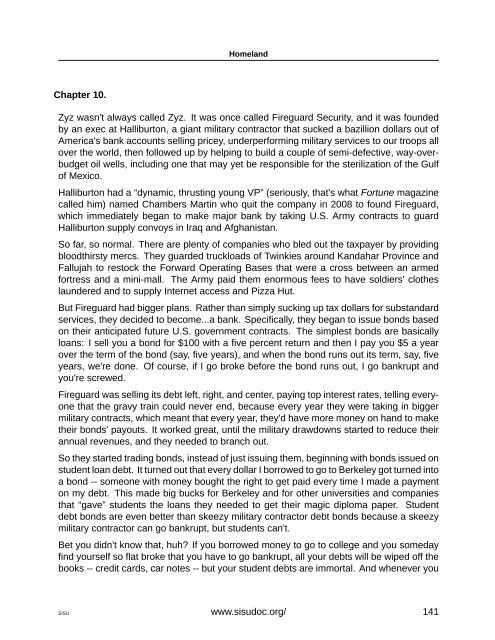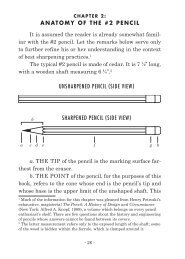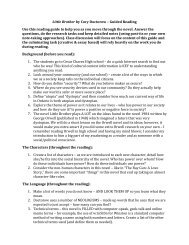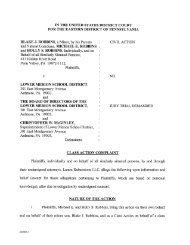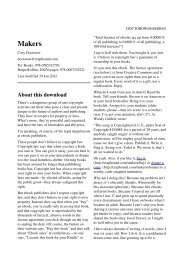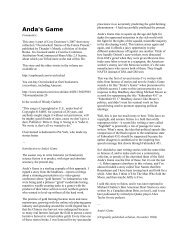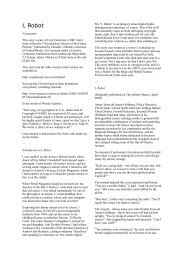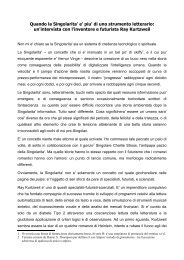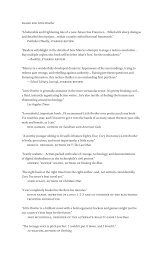Create successful ePaper yourself
Turn your PDF publications into a flip-book with our unique Google optimized e-Paper software.
Chapter 10.<br />
<strong>Homeland</strong><br />
Zyz wasn't always called Zyz. It was once called Fireguard Security, and it was founded<br />
by an exec at Halliburton, a giant military contractor that sucked a bazillion dollars out of<br />
America's bank accounts selling pricey, underperforming military services to our troops all<br />
over the world, then followed up by helping to build a couple of semi-defective, way-overbudget<br />
oil wells, including one that may yet be responsible for the sterilization of the Gulf<br />
of Mexico.<br />
Halliburton had a “dynamic, thrusting young VP” (seriously, that's what Fortune magazine<br />
called him) named Chambers Martin who quit the company in 2008 to found Fireguard,<br />
which immediately began to make major bank by taking U.S. Army contracts to guard<br />
Halliburton supply convoys in Iraq and Afghanistan.<br />
So far, so normal. There are plenty of companies who bled out the taxpayer by providing<br />
bloodthirsty mercs. They guarded truckloads of Twinkies around Kandahar Province and<br />
Fallujah to restock the Forward Operating Bases that were a cross between an armed<br />
fortress and a mini-mall. The Army paid them enormous fees to have soldiers' clothes<br />
laundered and to supply Internet access and Pizza Hut.<br />
But Fireguard had bigger plans. Rather than simply sucking up tax dollars for substandard<br />
services, they decided to become...a bank. Specifically, they began to issue bonds based<br />
on their anticipated future U.S. government contracts. The simplest bonds are basically<br />
loans: I sell you a bond for $100 with a five percent return and then I pay you $5 a year<br />
over the term of the bond (say, five years), and when the bond runs out its term, say, five<br />
years, we're done. Of course, if I go broke before the bond runs out, I go bankrupt and<br />
you're screwed.<br />
Fireguard was selling its debt left, right, and center, paying top interest rates, telling everyone<br />
that the gravy train could never end, because every year they were taking in bigger<br />
military contracts, which meant that every year, they'd have more money on hand to make<br />
their bonds' payouts. It worked great, until the military drawdowns started to reduce their<br />
annual revenues, and they needed to branch out.<br />
So they started trading bonds, instead of just issuing them, beginning with bonds issued on<br />
student loan debt. It turned out that every dollar I borrowed to go to Berkeley got turned into<br />
a bond -- someone with money bought the right to get paid every time I made a payment<br />
on my debt. This made big bucks for Berkeley and for other universities and companies<br />
that “gave” students the loans they needed to get their magic diploma paper. Student<br />
debt bonds are even better than skeezy military contractor debt bonds because a skeezy<br />
military contractor can go bankrupt, but students can't.<br />
Bet you didn't know that, huh? If you borrowed money to go to college and you someday<br />
find yourself so flat broke that you have to go bankrupt, all your debts will be wiped off the<br />
books -- credit cards, car notes -- but your student debts are immortal. And whenever you<br />
<strong>SiSU</strong> www.sisudoc.org/ 141


